
ESSENTIAL RECORDINGS
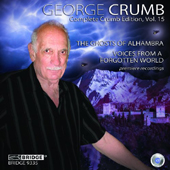
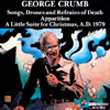
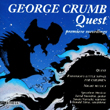
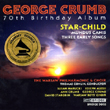
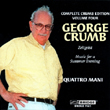
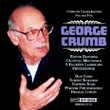
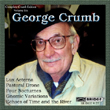
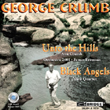
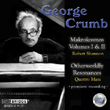
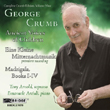
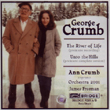
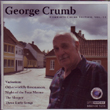
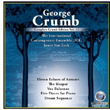
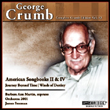
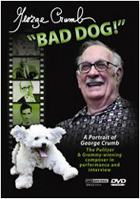
1- The Ghosts of Alhambra (Spanish Songbook I)
- Alba
- Las Seis Cuerdas
- Danza
- Paisaje
- Ay!
- Malagueña
- Memento
Patrick Mason (Baritone)
David Starobin (Guitar)
Daniel Druckman (Percussion)
2- Voices from a Forgotten World (American Songbook V)
- Bringing in the Sheaves
- Somebody Got Lost in a Storm
- The House of the Rising Sun
- Hallelujah, I'm a Bum!
- I Wonder as I Wander
- Song of the Thunder
- 'Tis the Gift to Be Simple
- Beautiful Dreamer
- Firefly Song
- The Demon Lover (A Ghostly Ballad)
Jamie Van Eyck (Mezzo-soprano)
Patrick Mason (Baritone)
Orchestra 2001
James Freeman (Conductor)
Volume 15 of the Complete George Crumb Edition, a long standing project by Bridge Records which spans just about as many
years. A series of recordings that has been instrumental in the release of such iconic American works as Black Angels, Ancient Voices of Children,
Vox Balaenae and Star-Child.
The Ghosts of Alhambra is a group of seven songs set to poetry by Federico Garcia Lorca, on strange and varied aspects
of life. Guitars, olive groves at night, gypsy women, morning bells, and drinking mariners. Based on these texts, Crumb's music takes on a different character befitting
each song, that requires the singer to convincingly act out and project the poem's mood. Baritone Patrick Mason not only achieves just that, but does
it so well as to pull you into the world as seen by Lorca. Add to this an instrumentation that, with its minimal intrusion, supports the vocal line and text, and never
supplants them. The music, in its advanced simplicity, finds the expressive essence of the words, and brings it forward. With just a few guitar notes and percussive
sounds behind the voice, George Crumb has managed to evoke the suitable backdrop for each and every song.
George Crumb threw a stone into the fabric of time and space, and the consequent ripples, reaching us now from a distant past, have warped and
deformed our perception of these heritage folksongs. He seems to have managed, by altering tempos and modifying the song's accompaniment whilst the melody
remains the same, to make these familiar old songs sound distant and part of a vanishing tradition. The title Voices from a Forgotten World
could not be more apt in its depiction of a past obliterated by modern technology. A hundred years ago, people would entertain themselves by singing songs to each other.
Hearing someone sing Beautiful Dreamer back then was probably quite the occasion. Probably just as much an occasion as watching the Super Bowl on a
High Definition widescreen television in the comfort of your own living room is today. With his odd "arrangements", Crumb has managed to create a sense
of loss, a perception of the songs shredding at the edges, of the music slowly decomposing. If that was his intent, than he succeeded very well at conveying a clear image
of cultural disintegration. If not, then my antennae are set to the wrong channel and I'm getting a fuzzy emotional reception. Nevertheless, the performers once again
really get into the character of each song and bring out its mood. Listen to how Patrick Mason hams it up in Hallelujah, I'm a Bum! or
the way Jamie Van Eyck whispers Beautiful Dreamer. It's all part of the illusion.
Another strong volume, this time of premiere recordings, to add to the comprehensive and ongoing George Crumb edition. May it become, over time, part of our new
collective cultural heritage.
Jean-Yves Duperron - March 2011